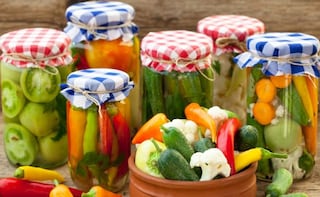Are you sure of the grocery that you bought today will stay fresh and tasty for a week or so? Most foods bought at a grocery store do not come with expiration date and need to be checked for their freshness from time to time. It is a common misconception that if we store foods in the refrigerator, they might stay fresh and edible. It is imperative to keep a track of the time a food can be kept before it begins to deteriorate, or in some cases, become unsafe and less nutritious. Sure, all foods have a certain shelf life and cannot be kept beyond a certain period.Our expert nutritionist, Dr. Shilpa Arora says, "every food has a shelf life and should not be consumed after the specified period. Considering the sources most foods come from nowadays, we must try to keep it simple and maintain a healthy and balanced life."
3. EggsEggs may last long for around two to four weeks if kept in the refrigerator. They can last up to one year if you take them out the shell, beat them and freeze in a freezer safe container. As far as hard-cooked eggs are concerned, you must consume them within a week, freezing them is not recommended.
5. Edible OilsEdible vegetable oil, corn and canola oil will last up to one to two years if unopened, while opened packages last till about six to eight months. Olive oil can stay till about six months.
7. Vegetables
Advertisement
- Milk: A packaged milk box doesn't need to be stored in the refrigerator if they are unopened. However, once opened, store it in the fridge and consume it within seven days. However, if you notice any discoloration, odour or a different texture, you must immediately throw it away. Powdered milk can last up to a year.
- Cheese: Hard cheese can last six months if unopened and must be consumed within three to four weeks after opening the pack. On the other hand, soft cheese should not be stored for more than a week.
- Cream: Heavy cream can last up to 10 days and sour cream for about one to three weeks if refrigerated well.
- Yoghurt: While yoghurt can survive for up to one to two weeks in the refrigerator, it can be frozen for about a month.
- Butter: Butter when kept in the refrigerator, can last up to two weeks and if frozen, it can extend to about a year. As far as peanut butter is concerned, unopened package can stay fresh until six to nine months, while opened package must be consumed within three months.
3. EggsEggs may last long for around two to four weeks if kept in the refrigerator. They can last up to one year if you take them out the shell, beat them and freeze in a freezer safe container. As far as hard-cooked eggs are concerned, you must consume them within a week, freezing them is not recommended.
- Ground meats- one or two days
- Chicken- one or two days
- Fish- Fish can be kept uncooked until one or two days, while cooked fish can last up to three to five days provided it is refrigerated.
- Bacon- five to seven days
- Hot dogs- Packaged hot dogs generally stay fresh till two weeks if unopened and must be consumed within one week after it is opened.
- Pork (sausage) - It lasts until one or two days in the refrigerator and one or two months in the freezer.
5. Edible OilsEdible vegetable oil, corn and canola oil will last up to one to two years if unopened, while opened packages last till about six to eight months. Olive oil can stay till about six months.
Advertisement
- Canned fruits- Should be stored in an air-tight container, can last up to 3 days.
- Apples - 1-2 months
- Bananas - 2-3 days or until they ripen
- Berries, cranberries - 3-4 weeks
- Grapes - 1-2 weeks
- Lemons - 2-5 weeks
- Melons (watermelons/muskmelons) - 6-8 days
- Oranges - 2-3 weeks
- Peaches - 2-3 days
- Pineapple - 3-5 days
- Pears - 10-14 days
- Plums - 2-3 days
- Kiwi - 6-8 days
7. Vegetables
- Canned Vegetables- Should be stored in air tight container, can stay up to 3 days
- Asparagus- 3-5 days
- Beans- 3-6 days
- Beetroot- 4-8 days
- Broccoli- 5-7 days
- Cabbage- 4-8 days
- Carrots- 1-3 days
- Cauliflower- 10-14 days
- Cucumber- 10-12 days
- Celery- 3-4 days
- Fennel- 6-7 days
- Lettuce - 10-12 days
- Mushrooms- 2-3 days
- Okra or lady finger- 5-7 days
- Onions- 1-3 weeks (must be kept in a dry cool place)
- Peas- 5-6 days
- Peppers- 1-2 weeks
- Potatoes- 2-3 weeks (do not refrigerate)
- Radishes- 2-3 weeks
- Spinach- 2-3 days
- Tomatoes- 7 days (ripe), 2-3 weeks (green)
- Turnips- 4-5 days
For the latest food news, health tips and recipes, like us on Facebook or follow us on Twitter and YouTube.
Advertisement
